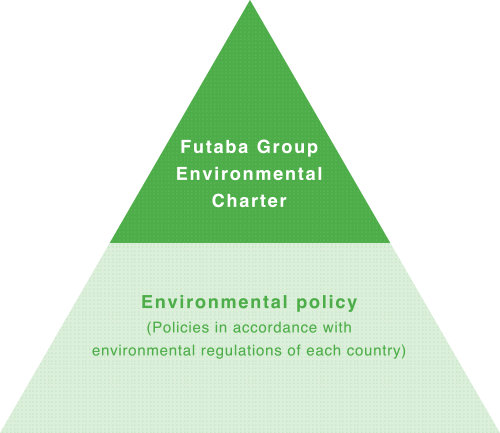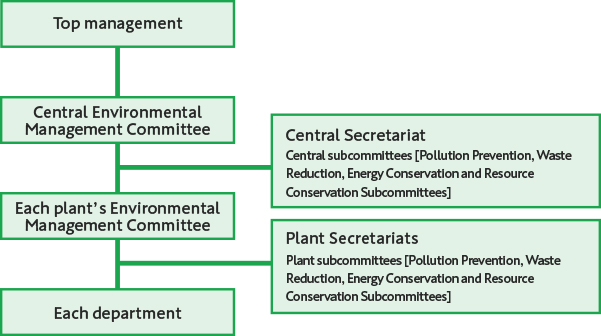
Environment Charter
The Futaba Group has established its Purpose as aiming to coexist harmoniously with nature by continuously contributing to a comfortable society through environmentally friendly manufacturing. We have enacted the Futaba Group Environmental Charter as a unified policy with the aim of working toward coexistence with nature as a group.

- 1. Contributing to a beautiful and prosperous future
- FUTABA aims to achieve sustainable development by realizing a decarbonized society, a society in harmony with nature, and a circular economy. To accomplish this, FUTABA will boldly challenge to minimize the environmental impact in all business activities and work towards the conservation of biodiversity.
- 2. Pursuit of Environmental Technology
- FUTABA strives to explore the potential of all environmental technologies. To achieve this, we will refine our core technologies and diligently work towards the development of new environmentally friendly technologies and products through meticulous manufacturing.
- 3. Collaboration with Society
- FUTABA values its connections with the local community involved in environmental conservation, as well as cooperation with affiliated companies and related industries, in order to be a responsible corporate citizen. We strive to establish better collaboration and build cooperative relationships.
- 4. Every employee plays an active role
- FUTABA not only strives to comply with environmental regulations in various countries and regions but also proactively develops improvement plans based on the environmental issues in each region. We promote continuous efforts with the participation of all employees.
Environmental policy
FUTABA Group in Japan recognizes global environmental protection as a key management issue and commits to reducing environmental burden to realize sustainable and decarbonized society.
- 1. We will comply with environmental requirements.
- Set and commit to complying with voluntary standards more strict than the various environmental protection ordinances and other requirements agreed to.
- 2. We will commit to protecting the environment.
- Specifically, commit to preventing pollution, making sustainable use of resources, mitigating and adapting to climate change, and protecting the ecosystem.
- 3. We will set clear targets for and commit to protecting the environment.
- Investigate and assess environmental impact of our business activities, and to effectively cut down or reduce the main cause, set environmental objectives and targets to be achieved within a range technically and economically feasible.
To achieve the environmental objectives and targets, commit to carrying out monozukuri and facility creation with less environmental impact from development to distribution stages. - 4. We will continuously improve our environmental management system.
- To achieve the environmental objectives and targets, clarify roles and responsibilities and create-perform-assess plans for further improvement.
Environmental management system
Futaba has established an environmental management system in conformance with ISO 14001 and is carrying out activities under the environmental policy established by top management. Under the manager responsible for the environment, we have established targets and are formulating and executing implementation plans.
System chart

Promotion of environmental management
In June 2011, Futaba acquired ISO 14001 certification for seven of its plants, and the results of improvement activities are being realized at each plant through cross-divisional activities centered on four subcommittees focused on pollution prevention, waste reduction, energy conservation and resource conservation. We will continue to work actively on the reduction of environmental impacts in our production activities.
The Futaba Group has acquired ISO14001 at its production bases one after another, and commits in carrying out environmental management aimed at realizing a sustainable and recycling-oriented society.
In order to further invigorate our environmental management activities in Japan, we have been working to obtain integrated certification, and have acquired integrated certification for Futaba Sumi in FY2022 and Futaba Kyusyu in FY2023.
In addition, We completed the acquisition of integrated certification for the Head Office and three domestic Group companies in June 2024. We plan to complete the acquisition of ISO14001 certification for all Group companies by acquisition of the certificate in India (FIG).
Number of ISO14001-certified production bases and target percentage thereof
| FY | 2020 | 2021 | 2022 | 2023 | 2024 | Target |
|---|---|---|---|---|---|---|
| Number of ISO14001-certified bases*1 | 23 | 24 | 25 | 25 | 24*2 | 25 |
| Target percentage*1 | 88% | 92% | 96% | 96% | 96% | 100% |
*1 Futaba Kyusyu Corporation's Miyata Plant is not counted in the table above because it is located in the premises of an automobile manufacturer's plant.
*2 In FY2024, the number of ISO14001 certified sites decreased due to the dissolution of Changsha Futaba Auto Parts Co., Ltd., an overseas consolidated subsidiary.
State of compliance with environmental laws and regulations
As part of our ISO 14001 activities, we care for the lives of people living in the vicinity of our plants, so to become a company that is widely supported and loved by the local community. Led by the Pollution Prevention Subcommittee, we have established voluntary standards that are stricter than those required by law and confirm the state of compliance regularly.
With regard to water quality standards for plant wastewater, we have established management systems for the septic tanks and wastewater systems inside plants and prevent deviation from the standard values by grasping trends in the deterioration of water quality.
In addition, with regard to noise, we are working on the reduction of noise levels through efforts including measuring and monitoring noise during nighttime operations, selecting production items and reducing the noise of scrap collection boxes.

